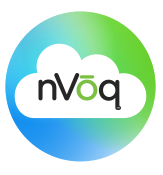
| Who is nVōq? | nVōq is a privately held provider of cloud-based speech recognition solutions, headquartered in Boulder, CO, since 2000. |
| About the nVōq platform? | The nVōq Platform is built on a cloud-based architecture using RESTful webservices/APIs for communication. For additional details about the nVōq architecture, please visit nvoq.com/developers, or email connect@nvoq.com. |
|---|---|
| nVōq API Services on Mac? | Yes, the nVōq.SPS (APIs) can be easily integrated with a variety of operating systems including Windows, Android, MacOS, iOS, and ChromeOS. |
| Do you offer an SDK? | No, we utilize RESTful webservices/API calls which are published by nVōq. |
| Evaluation period for no charge? | Upon signing an NDA, developers are provided with a demonstration environment to use for up to 30 days free of charge. Longer evaluation periods can be requested with an additional fee. |
| Is nVōq support available? | Yes, nVōq provides extensive self-help documentation, and our ISV Partner Support team is available to answer inquiries and provide solution design input, as requested. |
| How secure is your platform? | Our platform exceeds the standards specified by HIPAA and HITECH. Private health information stored on our platform is encrypted using the AES 256-bit encryption standard. |
| Can I integrate with my iOS app? | Yes, you can easily integrate nVōq.SPS dictation and matching capabilities using our RESTful webservices/API calls. |
| Available in other Languages? | Currently, the nVōq Platform supports North American English Other languages/dialects will be considered in the future based on regional demand. |
| Possible to self-host nVōq platform? | No, we do not generally offer our platform in a self-hosted configuration for end-customer deployment. |
| Does nVōq sell audio recorders or microphones? | No, but we can recommend certified dealers if needed. nVōq does not sell audio recorders nor microphones. However, we do have a recommended list of audio recording devices. |
| Can a “normal” authenticated user upload logs? | Normal users can upload logs. This is so the client software can self-report its logs using only the end-user's credentials, which might be the only credentials it has access to. |
| Does nVoq process the logs in a zip or gzip file? | nVoq support prefers that you upload logs in a zip format with compression enabled. Zip also allows you to group multiple related logs (such as rotated logs) into a single record. |
| What are the best practices when using nVoq to store logs? We currently generate a lot of logging data and need to ensure it all gets uploaded, but don’t need it real-time. | 1. I suggest a log upload filename like this: {ISO8601DATETIME}_{appname}_{username}.zip a. Most programming languages have a standard library call to get this kind of datetime stamp, e.g.: i./* C# */ DateTime.UtcNow.ToString("o",CultureInfo.InvariantCulture); ii./* JS */ date.toISOString() 2. Use log rotation so your log files don't grow indefinitely. Limit the number of rotated logs or only upload recent ones. 3. We have two logging-related API endpoints that the client can request. What you choose to do in the client based on the value of these properties is up to you, but this is one way we implemented it: a. https://{server}/SCVmcServices/rest/accounts/{accountname}/properties/diagnosticMode i. Checked at app startup. If true, client zips and uploads existing logs on the filesystem. Also causes the client to enable verbose logging instead of default logging. ii. Polled every 5 minutes. If true, client enables verbose logging. If false, client uses default logging. b. https://{server}/SCVmcServices/rest/accounts/{accountname}/properties/uploadClientLogMode i. Polled every 5 minutes. If true, client zips and uploads logs immediately and then uses the API to reset the property value to false. c. In the admin console, under Manage > Logging, you can interact with these properties like this: i. Select one or more users, then choose an action button 1. "Change Enabled" -- this action toggles the enabled state of the diagnosticMode property for all selected users. If toggling on, you will be asked to choose a time duration you would like the property to remain enabled for. The motivation behind having the diagnosticMode setting revert to false after an expiration time is to avoid uploading verbose logs indefinitely into the future, in case of, e.g., forgetting to turn it off. 2. "Request Logs" -- sets the uploadClientLogMode property to true for all selected users. When the client sees that this property is true, it immediately zips and uploads log files, then uses the API to reset the property to false. The idea is that an admin can request a user's app logs without having to contact the end-user and ask them to restart the application (which is the only other time the app uploads logs.) |